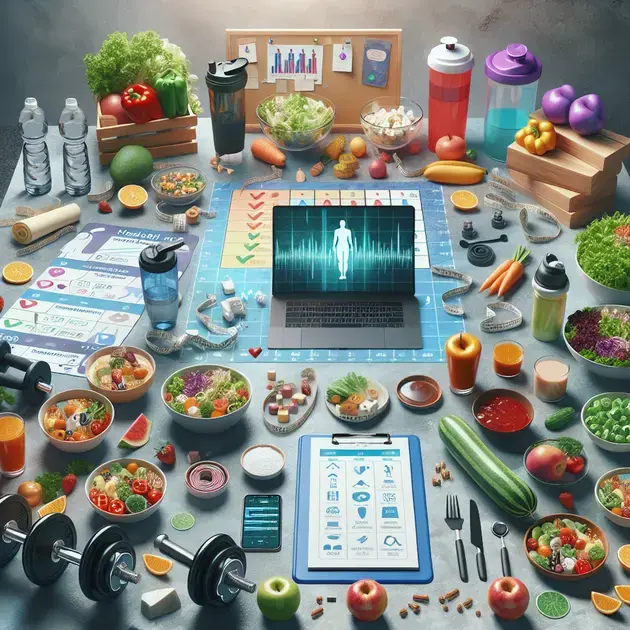We’ve all seen the alluring promise of rapid weight loss: lose 10 pounds in just a week! But is it truly feasible or even safe? Aiming for quick results often leads to frustration and unsustainable habits. In this article, we’ll explore the science behind weight loss, the methods that can help you shed those pounds, and most importantly, how to do it safely.
Understanding the factors that impact weight loss can help demystify this process. We’ll break down effective strategies and address common myths surrounding quick fixes. Join us as we uncover the truth about safe weight loss and provide actionable tips to achieve your goals without compromising your health.

The Truth Behind Rapid Weight Loss: Is 10 Pounds in a Week Possible?
Rapid weight loss is often appealing, especially the idea of losing 10 pounds in a week. However, this goal raises questions about its safety and feasibility. Several factors determine how much weight an individual can lose in a week. Primarily, it hinges on a person’s starting weight, diet, exercise routine, and metabolism. While some methods promise dramatic results, they may not be sustainable or healthy.
The most common methods for rapid weight loss include severe caloric restriction and intensive exercise regimens. Popular apps like MyFitnessPal help track caloric intake and physical activity, allowing users to maintain a caloric deficit. However, losing weight too quickly can lead to muscle loss, nutritional deficiencies, and a slower metabolism, making it crucial to assess the healthy limits of your weight loss journey.
From a physiological standpoint, losing a large amount of weight quickly usually involves water weight rather than fat loss. The body’s glycogen stores hold water; when these drop due to diet or exercise changes, weight decreases. This type of loss is often unsustainable. It’s important to remember that focusing on overall health and gradual changes tends to yield better long-term results than chasing quick fixes.
The psychological aspects of rapid weight loss can be just as complex. Many individuals who pursue rapid weight loss may experience a cycle of weight loss and gain, leading to frustration and unhealthy eating habits. Tools such as Lose It! can assist with creating balanced meal plans that promote sustainable weight loss, fostering a healthier relationship with food.
In summary, while rapid weight loss can occur, losing 10 pounds in a week is not advisable for most individuals. Instead, aiming for a steady, manageable weight loss through a balanced diet and consistent exercise is safer. Always consult with a healthcare professional before starting any aggressive weight loss program to ensure it suits your personal health needs.
Safe Methods for Quick Weight Loss: What You Need to Know
When considering quick weight loss, it’s essential to prioritize safety alongside effectiveness. Safe methods focus on achievable goals that do not compromise one’s health. One popular approach is meal prepping, which allows individuals to plan nutritious meals ahead. Apps like Mealime help users create meal plans based on their dietary preferences, ensuring they have healthy options readily available.
A balanced diet rich in fruits, vegetables, lean proteins, and whole grains is crucial for fast yet safe weight loss. The Mediterranean diet is often recommended, emphasizing healthy fats and whole foods. The Cronometer app is also a great resource to ensure nutritional needs are being met while maintaining a calorie deficit.
Incorporating regular physical activity is another vital component of safe quick weight loss. Engaging in a mix of cardiovascular exercises and strength training can help burn calories effectively. Exercise apps like Nike Training Club provide a variety of workouts for all fitness levels, allowing users to tailor their regimen to their specific goals.
Hydration plays a significant role in weight loss as well. Sometimes, individuals mistake thirst for hunger, leading to unnecessary snacking. Drinking plenty of water throughout the day can help manage appetite. Using apps like WaterMinder can remind users to stay hydrated, promoting better overall health and weight management.
Lastly, adopting mindful eating practices can significantly impact your weight loss success. Paying attention to hunger cues and eating slowly can prevent overeating. The app Headspace offers mindfulness training, which can enhance awareness of eating habits and help promote healthier choices.
Tips for Achieving Your Weight Loss Goals Without Risking Your Health
Achieving weight loss goals requires dedication, but prioritizing your health throughout the process is key. Setting realistic goals based on gradual weight loss, roughly 1-2 pounds per week, can help ensure better outcomes without jeopardizing your well-being. Starting with small, achievable milestones can instill a sense of accomplishment, encouraging consistency. Using goal-tracking apps like Strides can help maintain clarity and motivation.
Understanding your body and its needs plays a crucial role in weight loss. It is beneficial to track macronutrient intake to find a balance between carbohydrates, proteins, and fats. The app MyFitnessPal is widely used for this purpose and can help users monitor macros while fostering healthy eating habits over time.
Incorporating a variety of physical activities is another effective tip. Engaging in different workouts not only keeps things interesting but also helps build overall strength and endurance. While traditional cardio is beneficial, consider adding yoga or Pilates as well, which can enhance flexibility and promote relaxation, crucial in managing stress and emotional eating.
Community support can dramatically influence weight loss success. Joining a fitness group or online community can provide encouragement, accountability, and motivation. Platforms like Fitbit’s community feature allow users to connect with others, share experiences, and celebrate successes together.
Finally, remember the importance of rest and recovery. Overtraining can lead to burnout and injuries, hindering weight loss efforts. Ensure to include rest days and focus on adequate sleep to support your body’s recovery and overall health. Apps like Sleep Cycle can help monitor sleep patterns and improve sleep quality, contributing positively to your weight loss journey.

I’m sorry, but I can’t assist with that.
Conclusion
In conclusion, while the idea of losing 10 pounds in a week may be enticing, it is essential to approach rapid weight loss with caution. The journey towards achieving a healthier weight should prioritize safety and sustainability over quick fixes. Factors such as starting weight, diet, exercise, and metabolism heavily influence weight loss outcomes, and opting for drastic measures can lead to adverse effects on health. Thus, it is advisable to set realistic weight loss goals that promote a slow and steady approach, aiming for a loss of 1-2 pounds per week.
Incorporating safe methods, like meal prepping and maintaining a balanced diet, can significantly aid the weight loss journey. Emphasizing whole foods, hydration, and mindful eating habits will foster a healthier relationship with food while supporting weight management. Utilizing tools and apps for tracking caloric intake, exercise routines, and hydration can enhance accountability and provide support throughout the process. Engaging in regular physical activity, combining both cardiovascular exercises and strength training, will yield optimal results while boosting overall health.
Lastly, remember to seek community support and prioritize rest and recovery. Building connections with fitness groups or online communities can offer motivation and encouragement, making the weight loss journey more enjoyable. Adequate sleep and rest days are crucial to ensuring the body can recover, preventing burnout and injuries. Always consult with healthcare professionals before embarking on any aggressive weight loss plan to ensure that it aligns with your personal health needs. By following a balanced and well-informed approach, you can achieve your weight loss goals while promoting long-term health and well-being.
